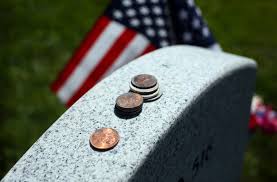Leaving coins on the headstones of those who served in the Military, especially those who died in combat, dates back at least as far as the Roman Empire.
The practice became especially popular in the United States during the Vietnam War because of the political climate throughout the 1960's and 1970's. Friends of those who died in combat left coins to let family members know that someone had visited the grave site. Leaving a coin on the headstone was more practical than contacting the family and risk becoming involved in a discussion about the war. Today it has become a way to pay respectful, silent homage to a comrade in arms.
Generally speaking, a visitor who did not know the deceased well enough to be considered a friend might leave a penny. Someone who went through boot camp or training with the deceased might leave a nickel. A friend who served in another platoon within the same company might leave a dime. A buddy who served in the same unit, or was with the deceased when he died, might leave a quarter, or more symbolic, a challenge coin.
Some Veterans leave coins as a "down-payment" to purchase a beer (or shot of Jeremiah Weed), or play a hand of poker when they are eventually re-united with the deceased buddy.
Today, the denomination of the coin left on the headstone has become less significant because so few people carry coins other than quarters.
The coins left on headstones within National Cemeteries and State Veterans Cemeteries are collected by cemetery staff from time to time and are used to maintain the grounds. Some cemeteries use the coins to help pay for the burial costs of indigent Veterans.
I hope each and every one of you that reads this has a wonderful Memorial Day weekend and that, if even for a moment, you recognize the sacrifice of those who died.
Thank you.
Bill
"They are dead; but they live in each Patriot’s breast,
And their names are engraven on honor’s bright crest" —Henry Wadsworth Longfellow, The Battle of Lovell’s Pond
#memorialday #rememberthefallen

 RSS Feed
RSS Feed